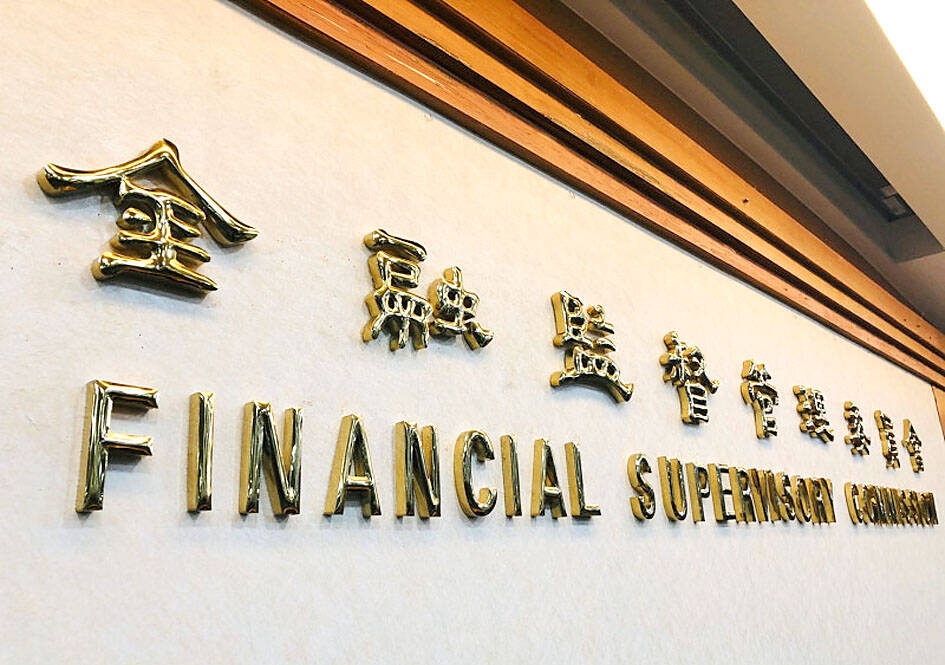The Financial Supervisory Commission (FSC) fined financial institutions and publicly listed firms NT$129.02 million (US$4.03 million) during the first eight months of this year for internal control, financial services misconduct and corporate governance-related breaches, data released last week by the commission showed.
The fines were down 30.42 percent from the NT$184.42 million imposed during the same period last year and were less than half — 46.97 percent — of the commission’s target of NT$274.68 million for the whole of this year, the commission said.
The commission attributed the decline in fines to a higher comparison base last year, when it meted out heavy penalties to a financial holding company for corporate governance breaches after a major shareholder was found to have improperly interfered in the company’s operations, as well as to several banks for employee involvement in assisting fraud rings or theft from clients.

Photo: Kelson Wang, Taipei Times
Among the commission’s three major subordinate agencies, the Banking Bureau and the Insurance Bureau imposed a lower total amount of fines in the first eight months of this year compared with the same period last year, while the Securities and Futures Bureau imposed slightly more.
In the January-to-August period, the financial penalties imposed by the Banking Bureau were NT$39.72 million, down 52.09 percent from a year earlier. The largest fine was NT$12 million imposed on Taichung Commercial Bank Co (台中商銀), with fines of NT$8 million respectively imposed on Shin Kong Commercial Bank (新光銀行) and Cathay United Bank (國泰世華銀行).
The Insurance Bureau imposed total fines of NT$36 million during the eight-month period, down 27.13 percent year-on-year. The largest fine was NT$9 million imposed on the Taiwan branch of Cardif Assurance Vie (法國巴黎人壽), followed by a NT$6 million fine imposed on the Taiwan branch of Cardif Assurance Risques Divers (法國巴黎產物保險).
Both are subsidiaries of the same France-based international insurance company.
During the same period, the Securities and Futures Bureau fined several securities and futures firms, including Time Securities Investment Consulting Co (時間投顧) and Cathay Securities Investment Trust Co (國泰投信), for a total of NT$53.3 million, up 0.34 percent year-on-year.
The commission’s budget documents show that it has set target penalties of NT$263.37 billion for next year, down about 4.12 percent from this year’s target and the lowest in the past four years.
The commission said that it views these fines as a way to help firms correct their deficiencies, not as a means of generating income.

Taiwan will prioritize the development of silicon photonics by taking advantage of its strength in the semiconductor industry to build another shield to protect the local economy, National Development Council (NDC) Minister Paul Liu (劉鏡清) said yesterday. Speaking at a meeting of the legislature’s Economics Committee, Liu said Taiwan already has the artificial intelligence (AI) industry as a shield, after the semiconductor industry, to safeguard the country, and is looking at new unique fields to build more economic shields. While Taiwan will further strengthen its existing shields, over the longer term, the country is determined to focus on such potential segments as

UNCERTAINTY: Innolux activated a stringent supply chain management mechanism, as it did during the COVID-19 pandemic, to ensure optimal inventory levels for customers Flat-panel display makers AUO Corp (友達) and Innolux Corp (群創) yesterday said that about 12 to 20 percent of their display business is at risk of potential US tariffs and that they would relocate production or shipment destinations to mitigate the levies’ effects. US tariffs would have a direct impact of US$200 million on AUO’s revenue, company chairman Paul Peng (彭雙浪) told reporters on the sidelines of the Touch Taiwan trade show in Taipei yesterday. That would make up about 12 percent of the company’s overall revenue. To cope with the tariff uncertainty, AUO plans to allocate its production to manufacturing facilities in

COLLABORATION: Given Taiwan’s key position in global supply chains, the US firm is discussing strategies with local partners and clients to deal with global uncertainties Advanced Micro Devices Inc (AMD) yesterday said it is meeting with local ecosystem partners, including Taiwan Semiconductor Manufacturing Co (TSMC, 台積電), to discuss strategies, including long-term manufacturing, to navigate uncertainties such as US tariffs, as Taiwan occupies an important position in global supply chains. AMD chief executive officer Lisa Su (蘇姿丰) told reporters that Taiwan is an important part of the chip designer’s ecosystem and she is discussing with partners and customers in Taiwan to forge strong collaborations on different areas during this critical period. AMD has just become the first artificial-intelligence (AI) server chip customer of TSMC to utilize its advanced

Chizuko Kimura has become the first female sushi chef in the world to win a Michelin star, fulfilling a promise she made to her dying husband to continue his legacy. The 54-year-old Japanese chef regained the Michelin star her late husband, Shunei Kimura, won three years ago for their Sushi Shunei restaurant in Paris. For Shunei Kimura, the star was a dream come true. However, the joy was short-lived. He died from cancer just three months later in June 2022. He was 65. The following year, the restaurant in the heart of Montmartre lost its star rating. Chizuko Kimura insisted that the new star is still down